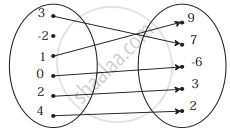Advertisements
Advertisements
प्रश्न
If f(x) = sin [π2] x + sin [−π]2 x, where [x] denotes the greatest integer less than or equal to x, then
विकल्प
(a) f(π/2) = 1
(b) f(π) = 2
(c) f(π/4) = −1
(d) None of these
उत्तर
(a) f(π/2) = 1
f(x) = sin [π2] x + sin [−π2]x
\[\Rightarrow f(x) = \sin \left[ 9 . 8 \right]x + \sin \left[ - 9 . 8 \right]x\]
\[ \Rightarrow f(x) = \sin 9x - \sin 10x\]
\[f\left( \frac{\pi}{2} \right) = \sin 9 \times \frac{\pi}{2} - \sin 10 \times \frac{\pi}{2}\]
\[ \Rightarrow f\left( \frac{\pi}{2} \right) = 1 - 0 = 1\]
APPEARS IN
संबंधित प्रश्न
Let f : R → R and g : C → C be two functions defined as f(x) = x2 and g(x) = x2. Are they equal functions?
Let f and g be two real functions defined by \[f\left( x \right) = \sqrt{x + 1}\] and \[g\left( x \right) = \sqrt{9 - x^2}\] . Then, describe function:
(i) f + g
Let f and g be two real functions defined by \[f\left( x \right) = \sqrt{x + 1}\] and \[g\left( x \right) = \sqrt{9 - x^2}\] . Then, describe function:
(iv) \[\frac{f}{g}\]
Let f and g be two real functions defined by \[f\left( x \right) = \sqrt{x + 1}\] and \[g\left( x \right) = \sqrt{9 - x^2}\] . Then, describe function:
(v) \[\frac{g}{f}\]
Let f and g be two real functions defined by \[f\left( x \right) = \sqrt{x + 1}\] and \[g\left( x \right) = \sqrt{9 - x^2}\] . Then, describe function:
(vii) f2 + 7f
If f(x) = loge (1 − x) and g(x) = [x], then determine function:
(iii) \[\frac{f}{g}\]
Write the range of the real function f(x) = |x|.
Let A = {1, 2, 3} and B = {2, 3, 4}. Then which of the following is a function from A to B?
If f(x) = cos (loge x), then \[f\left( \frac{1}{x} \right)f\left( \frac{1}{y} \right) - \frac{1}{2}\left\{ f\left( xy \right) + f\left( \frac{x}{y} \right) \right\}\] is equal to
If \[f\left( x \right) = \frac{\sin^4 x + \cos^2 x}{\sin^2 x + \cos^4 x}\] for x ∈ R, then f (2002) =
If \[\left[ x \right]^2 - 5\left[ x \right] + 6 = 0\], where [.] denotes the greatest integer function, then
Check if the following relation is function:

Find x, if f(x) = g(x) where f(x) = `sqrt(x) - 3`, g(x) = 5 – x
Find the domain and range of the following function.
f(x) = `root(3)(x + 1)`
Express the area A of a square as a function of its side s
Express the area A of circle as a function of its circumference C.
Express the following logarithmic equation in exponential form
`log_5 1/25` = – 2
Write the following expression as a single logarithm.
5 log x + 7 log y − log z
Prove that logbm a = `1/"m" log_"b""a"`
Prove that alogcb = blogca
Solve for x.
x + log10 (1 + 2x) = x log10 5 + log10 6
If `log((x + y)/3) = 1/2 log x + 1/2 logy`, show that `x/y + y/x` = 7
If f(x) = 3x + 5, g(x) = 6x − 1, then find (f − g) (2)
Select the correct answer from given alternatives.
If f : R → R is defined by f(x) = x3 then f–1 (8) is equal to :
Answer the following:
Solve for x, logx (8x – 3) – logx 4 = 2
Answer the following:
If a2 = b3 = c4 = d5, show that loga bcd = `47/30`
A function f is defined by f(x) = 2x – 3 find x such that f(x) = x
The data in the adjacent table depicts the length of a person's forehand and their corresponding height. Based on this data, a student finds a relationship between the height (y) and the forehand length (x) as y = ax + b, where a, b are constant.
| Length ‘x’ of forehand (in cm) |
Height 'y' (in inches) |
| 35 | 56 |
| 45 | 65 |
| 50 | 69.5 |
| 55 | 74 |
Find a and b
The data in the adjacent table depicts the length of a person's forehand and their corresponding height. Based on this data, a student finds a relationship between the height (y) and the forehand length (x) as y = ax + b, where a, b are constant.
| Length ‘x’ of forehand (in cm) |
Height 'y' (in inches) |
| 35 | 56 |
| 45 | 65 |
| 50 | 69.5 |
| 55 | 74 |
Find the length of forehand of a person if the height is 53.3 inches
If the domain of function f(a) = a2 - 4a + 8 is (-∞, ∞), then the range of function is ______
The domain of the function f(x) = log3+x (x2 - 1) is ______.
Find the domain of the following function.
f(x) = [x] + x
Find the domain of the following functions given by f(x) = x|x|
Find the range of the following functions given by f(x) = |x − 3|
Let f(x) = `sqrt(x)` and g(x) = x be two functions defined in the domain R+ ∪ {0}. Find (f + g)(x)
Range of f(x) = `1/(1 - 2 cosx)` is ______.
The range of the function y = `1/(2 - sin3x)` is ______.
Which of the following functions is NOT one-one?
The domain of f(x) = `sin^-1 [log_2(x/2)]` is ______.
